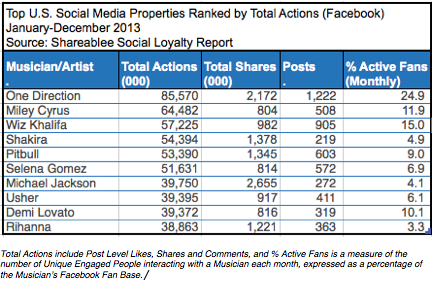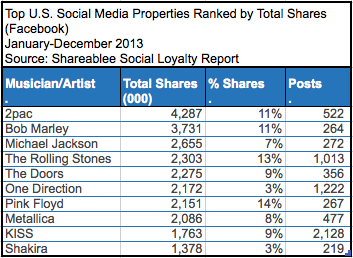In the year of the twerk, fans shared nearly 65 million moments on Facebook with Miley Cyrus, making Miley the "Most Engaging Single Artist" in 2013. (Only boy band, One Direction, received more actions in the same ranking according to my social measurement company, Shareablee).
Which is impressive, until you realize something else: Miley was nowhere near the top for "Most Shared." (She was, in fact, #29, and didn't even make the official ranking).
"Most Shared" Artist for 2013? Deceased rapper, Tupac Shakur.
Although Miley had 2.5 times more fans than 2pac (37 million, compared with 14 million), 2pac received 5.5 times more shares per post on Facebook than Miley did, on roughly the same amount of posts. Bob Marley, Michael Jackson, the Doors and Pink Floyd also made it into the Top 10 Most Shared. In fact, five out of the top ten "Most Shared Musicians and Artists" for 2013 were long dead, and only two could currently be considered popular artists.
How could this happen to Miley?
Social media is often touted for its potential for immediacy, and for the ability for musicians, celebrities and even brands to be "in the moment" (think Oreo's 2013 fame for its Superbowl spontaneity). But it wasn't spur-of-the-moment posting that was rewarded with shares in 2013. We examined the top shared posts among musicians, and here's what we found:
1. Self-Focused Updates will not be shared (although they might attract likes and comments):
In social media, as in life, if you talk about yourself too much without asking questions, considering your listeners or showing an interest in others, your messages may be "liked" or "commented" on, but they won't be shared. It doesn't matter how popular you are.
Self-focused content includes "selfies," commercial updates about a new song release (without any value-add for social fans) and minute-by-minute updates about your day.
2. Sharing happens when you make people care:
We share when content can stop us in our tracks, and make us feel something. Whether it's about the loss of someone we loved or admired, or something that was funny, or sad -- if you can evoke emotion, you are more likely to be shared.
While many of Miley's posts in 2013 felt authentic and unedited (unlike, say, those of One Direction) there was little revealed about her inner life, or what she cared about. This meant she did not activate her fans to spread her updates, but rather just bookmark them.
In addition, emotion begets emotion. We saw that when content was shared by fans with messages such as: "too funny!" or, "This is so sad," they were then much more likely to be re-shared with a greater velocity. The same posts shared without comment were three times less likely to be re-shared, indicating that the very presence of emotional commentary by others made it more likely that the same feelings would be experienced by the viewer. This mirroring of emotions has also been scientifically proven in this recent study regarding the virality of empathy and compassion by Tania Singer of the Max Planck Institute -- revealing that humans automatically share the emotions of others when exposed to their emotions. Miley could use this the way that many of the top shared artists did, to encourage her audience to experience life through her eyes, and to therefore spread the message on.
3. Positive or inspiring messages promote sharing:
In social media, as in life, everyone wants something to believe in, and it pays to not be a downer. Among the most shared content by musicians were uplifting or memorable quotes -- even from Tupac. Although Tupac was not known in life for his upbeat lyricism, his most shared posts of 2013 included graphics stating: "Negative people need drama like oxygen, stay positive, it will take their breath away," and, "Hard times will always reveal true friends." Equally, Bob Marley achieved his top shared status with quotes such as '"Every man thinketh his burden is the heaviest," and, "What we need is love, to guide and protect us on."
What this means is, any time an artist can associate themselves with words that inspire others to feel better, such content is far more likely to connect with others who will then be more likely to pass that message on.
Word to the wise -- although social media is, by its nature, ephemeral, don't confuse the medium with the message. Huge returns come to those who treat content as though it were meant to last. Even in those fleeting moments as people scroll their newsfeed, we still want to feel important, and to connect emotionally, preferably with something uplifting.

